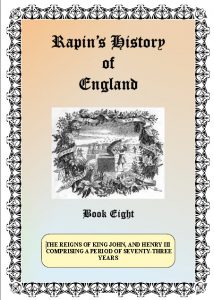7. JOHN SIRNAMED LACK-LAND[1]
AD 1199
THOUGH Richard made the prince his brother heir to all his dominions, John’s right was not thereby rendered incontestable. In the affair of the succession, two queries presented themselves not easy to be decided. The first was, whether, according to law, Arthur duke of Bretagne, as representing his father Geoffrey, elder brother of John, had as much or more right than his uncle John, who was one degree nearer.
In the second query, the business was to know, whether in case the laws favoured the nephew, Richard had power to dispose of his dominions by a will contrary to custom.
Two things rendered the decision of these queries exceedingly difficult: first, the diversity between the laws of the several states, to which this succession related. Secondly, in the kingdom of England, the largest and most considerable part, the right of primogeniture was neither correctly understood, nor regularly acted upon; consequently, there was no settled law concerning the succession to the crown, by which the kings were allowed or debarred the power of disposing of it as they pleased.
The strongest argument in favour of John was, that, there being no established law, his title was as good as Arthur’s; and moreover, he had for him king Richard’s will. But on the other hand, in most of the provinces possessed by the English in France, the right of representation in the lineal descent was generally received. This affair would have been liable to great discussions, had it been to be determined in a court of justice, or in the general assembly of the states; but John, not thinking proper to commit his right to the decision of any tribunal, took a course, which to him seemed not so uncertain.
